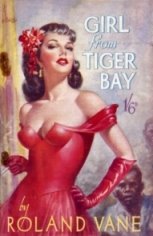Girl from Tiger Bay

If you thought Shirley Bassey was the original 'Girl from Tiger Bay' you'd be quite wrong. A few years before Bassey started making a name for herself this pulp novel (see pic) was published featuring Gwen Jones from Tiger Bay. Written by Roland Vane (pseudonym of pulp writer Ernest McKeag) it is a quite staggering piece of racism as the blurb on the back demonstrates:
Why are certain types of white women attracted - apparently irresistably - towards coloured men? The question has intrigued scientists, psychiatrists and social workers for centuries. Now Roland Vane in this frankly realistic novel, delves into the reasonings of a woman of this type.
Born in a Cardiff slum and reared in the sordid sophistication of "Tiger Bay", his heroine finds herself drifting, through no fault of her own, into the arms of the only individual who has ever shown her kindness - a coloured man!
This book is not untypical. After WW2 when the pulp fiction industry boomed there was a demand for British versions of American thrillers. What they needed were believable settings in which these lurid fictions could take place and Tiger Bay, long since demonised, fitted the bill perfectly. As well as Girl from Tiger Bay (1950) by Roland Vane there was Tiger Bay (1946) by David Martin; and Once in Tiger Bay (1947), Return to Tiger Bay (1950) and King of Tiger Bay (1952) by JM Walsh.
It wasn't just the pulps either, a dubious feature in Illustrated magazine entitled Tiger Bay Fights Thugs (1953) carried some suspiciously posed-looking photographs and a questionable story about an arms cache. In 1959 the film Tiger Bay was released remaining, until the building of the Millennium Stadium, Cardiff's main cultural reference point for those living outside the city.
What these books etc have in common is that none of their authors were actually from Cardiff. It would take another 50 years for local writers to redress the balance and properly fictionalize the city and its docks.
As for Bassey herself she too was exploiting the Tiger Bay tag. Her debut single Burn My Candle (at Both Ends) (1955), written especially for her, is an extended sexual metaphor which was banned by the BBC for containing the word 'sex'. However, despite being marketed as a Docks girl and playing up to the risque stereotype "Our Shirl" was in fact brought up in Splott. Little wonder perhaps she preferred the more romantic sounding sobriquet of 'Girl from Tiger Bay'.

<< Home